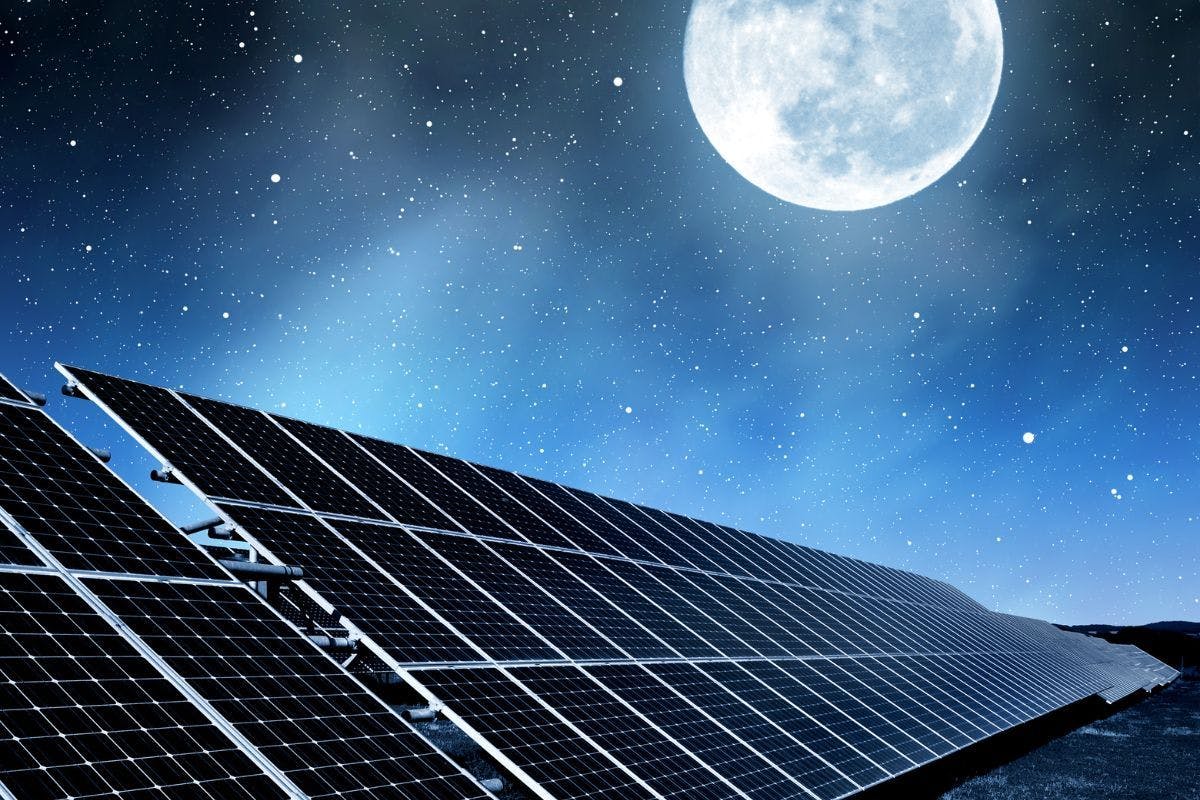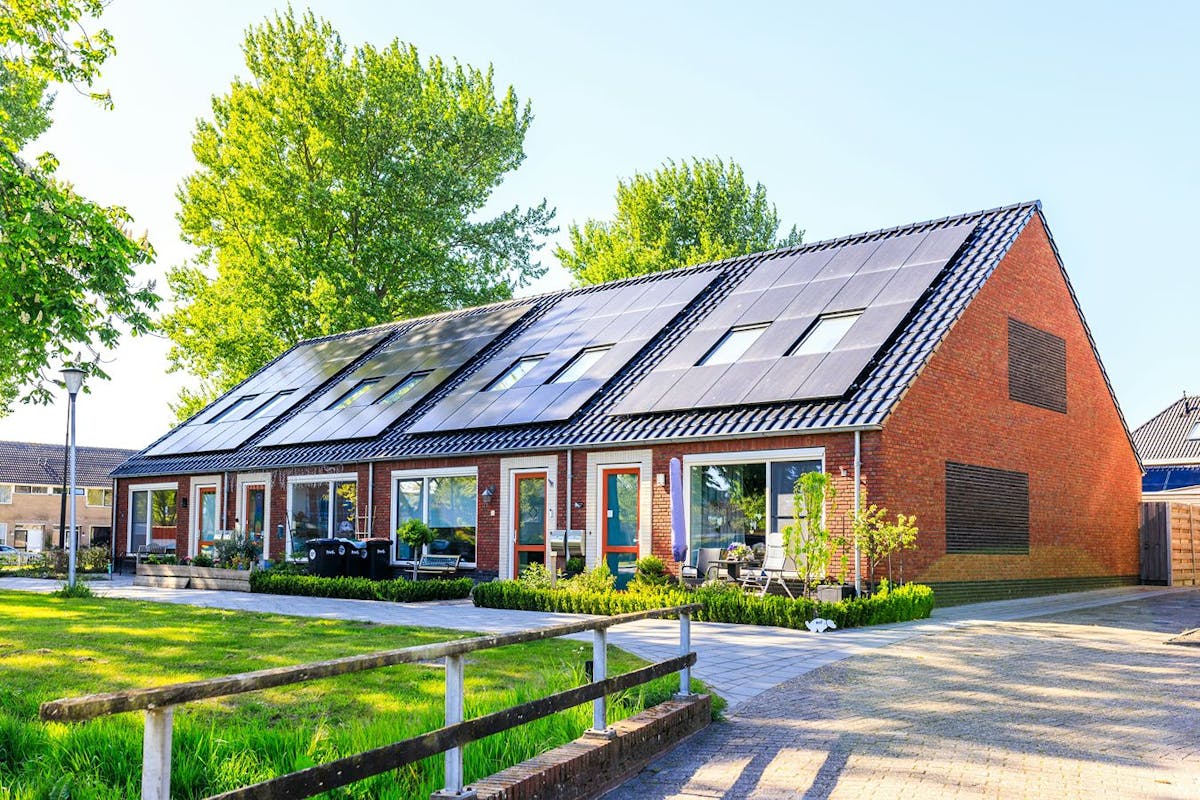Do Solar Panels Work at Night?
Last edited
Author
Andrew Giermak
Solar and Electrification Writer and Editor
Editor
Andrew Blok
Electrification and Solar Writer and Editor

Solar panels need the sun to generate electricity. Does that mean they're useless for half the day?
While your home solar panels won't be directly powering your home at night, they can still reduce your nighttime energy bills in a couple of ways. If you've got net metering (or another bill crediting system) from your utility or have added a solar battery to your home, you can keep lowering your electricity costs, even when the sun's down.
See how much you can save by going solar with Palmetto
How Solar Panels Work at Night
Solar panels harness sunlight and convert its energy into electricity. No sun means no electricity, right?
Well… yes. Solar panels start generating electricity when the sun comes up and stop when the sun sets. They generate the most when sunlight hits them most directly, typically around midday, though it depends on the weather and the panels' orientation.
Solar panels can still technically produce electricity at night if they’re exposed to another source of light, but you’d use more energy than you generate.
Solar panels will generate minuscule amounts of electricity when exposed to ambient light from the moon, street lamps, or city glow. Amazingly, solar panels can produce electricity using the light of a full moon, but it’s 350,000 times slower than from sunlight.
How Solar Energy Systems Work at Night
A solar energy system consists of more than just the panels, and there are several ways in which solar panels can benefit you overnight. The nighttime benefits of your solar panels differ depending if your system has a battery or not.
Grid-connected solar panels at night
At night, homes connected to the grid can draw power from their electric utility. This electricity is purchased at retail rates, though you may have credits from excess solar energy you sent to the grid during the day.
Here’s how those credits — from utility programs like net metering and net billing — work:
- Throughout the day, your solar panels produce more electricity than your house can use. For example, on a bright day, your solar panels generate 45 kWh of electricity, while your home consumes 30 kWh before the sun goes down.
- The remaining 15 kWh is sent to the grid and credited towards your energy bills. The value of these solar credits vary by state, utility, and policy. Compensation can be seen on utility bills and within solar monitoring apps.
- These credits are applied to your account to “cancel out” the cost of any electricity drawn from the grid, such as, at night. In this case, your credits cover some or all of the cost of your overnight electricity from the grid.
See how much you can save by going solar with Palmetto
Battery-connected systems at night
Whether your home is connected to the grid or is off the grid, backup battery storage can give you access to your solar energy at night. If your property is completely off the grid, a battery is 100% necessary.
A battery-backed solar energy system works like this:
- Excess solar produced throughout the day is sent to the battery storage bank. Any electricity beyond battery capacity is sent to the grid, where it may earn net metering credits.
- At night, homeowners can draw solar electricity from the battery bank. The solar power will pass from the battery through an inverter so it can run home devices directly using wall outlets.
- In the morning, the batteries can be recharged when new sunlight is available.
Backup batteries can also let homeowners tap into their solar resources during rainy days, blackouts, or extended periods of overcast weather, fog, or smoke. Today’s top solar batteries include app-based controls and advanced features to manage home energy use efficiently.
How to Optimize Solar Energy Systems for Night Use
When designing your system, solar installers won’t take into account the miniscule amount of nighttime solar energy. Still, there are things you can do to maximize your renewable energy use at night.
- Seek annual consumption coverage: Find the right size solar system to cover your annual electricity consumption. If you have net metering available, credits generated through the day and summer can be applied to your electricity bills at night and throughout the parts of the year with fewer daylight hours.
- Consider a battery: As net metering policies change, such as with California’s NEM 3.0, battery storage can help solar system owners have more control over their solar energy use and costs overnight.
- Pair with smart home devices: Homes with solar panels can utilize integrated smart devices for optimal home energy use, including timers, sensors, smart thermostats, energy-efficient lighting, heat pumps, smart plugs, and more.
- Employ smart energy habits: Homes that use most of their energy when the sun is up can benefit the most from solar installations, and homeowners who monitor their solar energy production can make more informed decisions to ensure long-term savings.
Learn More About Solar, Day or Night
Although solar panels rely on direct sunlight to generate electricity, net metering and backup batteries enable renewable power use 24/7/365. Homeowners employing smart energy habits can maximize the value of solar panels, both at night and year-around to achieve environmental and financial goals.
If you are interested in a free consultation, use Palmetto's online solar savings calculator.
See what solar can do for you:
Frequently Asked Questions
Do solar panels still work at night?
Solar panels can generate a microscopic level of power from moonlight or ambient light at night, but homes with solar panels need to draw electricity from the grid or a battery bank at night.
Do you need a battery to get solar panels?
No, you don’t have to have a battery with a home solar panel system. Many solar owners choose to go solar without battery storage.
Can solar panels use moonlight?
Scientifically speaking, yes, solar panels generate a very small amount of electricity from moonlight. Practically, solar panels generate effectively no usable amount of power from moonlight.
Disclaimer: This content is for educational purposes only. Palmetto does not provide tax, legal, or accounting advice. Please consult your own tax, legal, and accounting advisors.


